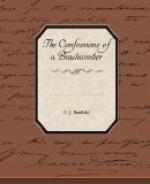Occasionally there are as many as four blacks about the place. They come and go from the mainland, some influenced by the wish for the diet of oysters for a time. “Me want sit down now; me want eat oyster.” At rare intervals we are entirely alone for months together, and then cultural operations stand still. Twice, a considerable portion of the plantation was silently overrun by the scouts of the jungle, and had to be re-surveyed in order to locate smothered-up orange-trees. Our staff, domestic and otherwise, usually consists of one boy and his gin, and save for the housework, affairs are not conducted on a serious or systematic plan. The spur necessity not being applied, there is no persistent or sustained effort to make a profit, and, of course, none is earned.
In a few months from the felling of the first strip of jungle and the burning off of the timber and rubbish, however, we grew produce that went towards the maintenance of the establishment. That pious old man who lived to the majestic age of 105, and during the last ninety years existed wholly upon bread and water, was not the only one who had “a certain lusting after salad.” Until we grew fruit, the papaw, the quickest and amongst the best, vegetables were more necessary.
Our plantation, all carved out of the jungle, has an area of 4 1/2 acres. We have orange-trees (two varieties), just coming into bearing, and from which profits are expected; pineapples (two varieties), papaws, coffee (arabica), custard apples, sour sop, jack fruit, pomegranate, the litchee, and mangoes in plenty. Sweet potatoes are always in successive cultivation, also pumpkins and melons, and an occasional crop of maize. Bananas represent a staple food. We have had fair crops of English potatoes, and have grown strawberries of fine flavour, though of deficient size, among the banana plants. Parsley, mint, and all “the vulgar herbs” grow freely. Readers in less favoured climes may hardly credit the statement that pineapples are so plentiful in the season in North Queensland that they are fed to pigs as well as horses. Twenty good pines for sixpence!—who would cultivate the fruit and market it for such remuneration? Hundreds of tons of mangoes go absolutely to waste every year. The taste for this wholesome and most delicious fruit has not yet become established in the large centres of population of Australia. At one time the same could he said of bananas; but now the trade has become prodigious. The era of the mango has yet to come.




